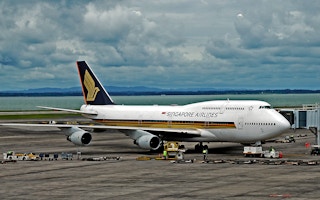In a push for cleaner skies, Singapore is studying for the first time the feasibility of airlines using alternative fuels.
Singapore Airlines (SIA) and the Civil Aviation Authority of Singapore (CAAS) are doing the joint research, with the aid of hired consultants.
They will look into the benefits, requirements and cost of using alternatives, a CAAS spokesman told The Straits Times.
The study, expected to start later this year, should take about six months. The cost has not been finalised.
Whether the intention is to eventually draft policies to require or encourage Singapore carriers to make the switch is premature to say, industry observers said.
SIA spokesman Nicholas Ionides said the new collaborative effort will take the studies it has done on its own to the next level.
Its move is also in concert with the International Air Transport Association’s (Iata) global drive to get airlines to eventually switch from fossil fuels like oil to alternative sources, namely biofuels, which cause less pollution.
It will help to further reduce the industry’s carbon emission, which is about 2 per cent of man-made greenhouse emissions currently.
But it wants to do better. Said Iata’s assistant director of environment (technology), Mr Thomas Roetger: “We must put in place appropriate steps to further limit and reduce carbon emissions.”
Iata has pledged that from 2020, the industry will achieve growth without increasing its carbon emission. By 2050, the target is for its carbon emission to be half that of 2005.
The focus on biofuels follows the significant strides made by the industry in recent years in reducing its carbon footprint, Mr Roetger said, citing the investment in more fuel-efficient planes and air traffic service providers helping to shorten flight times.
Biofuels used in aviation are typically extracted from plant sources that are not used in food, such as algae.
Since 2011, they have been certified safe for planes when used with today’s jet fuel. Further studies and tests are being done on whether a complete switch is safe.
Sixteen airlines have tried out the mix since then, completing more than 1,500 commercial passenger flights. The carriers include Air France, Air China and Thai Airways.
SIA has not done any such test flights.
The biggest obstacle to the widespread use of biofuels is price, which is almost double that of jet fuel, Mr Roetger said.
But he foresees prices falling in the coming years as demand grows and suppliers achieve economies of scale.
Iata is also talking to governments on how they can incentivise the use of alternative fuels for aviation, he said.
Mr Ionides shares his vision: “The way forward is to ensure there is enough supply and ready infrastructure to support the deployment of alternative fuels in an economically viable manner.”
CAAS, SIA to study alternative fuel use

Paling popular
-
![Kelvin Wong DBS at ASIFMA 2024]() Cirebon 1’s financial advisor says the model "might not be replicable" nationwide as grid stability costs were overlooked …
Cirebon 1’s financial advisor says the model "might not be replicable" nationwide as grid stability costs were overlooked … -
![COP29_Baku_Delegates]()
Berita / Polisi & Kewangan
Analysis: Which countries have sent the most delegates to COP29?
More than 65,000 delegates have registered to attend the COP29 climate summit in Baku, Azerbaijan, potentially making it … -
![COP29 president Mukhtar Babayev, a former oil and gas executive]()
Berita / Polisi & Kewangan
COP needs overhaul, including curbs on fossil fuel lobbying, say scientists and Paris treaty architect
In an open letter to the UN, a group of concerned climate-watchers called for stronger transparency and disclosure … -
![G77 China Vice Yu]()
Berita / Polisi & Kewangan
‘It is not charity’: COP29 closes first week without agreement on new climate finance goal
Rich nations have the “legal and moral obligation” to pay the US$1.3 trillion that developing countries are asking … -
![SG coffee]()
Berita / Karbon & Cuaca
How Southeast Asian countries are positioning themselves at COP29
Eco-Business takes a look at the key issues being pushed at the pavilions of Asean countries at the … -
![Transition credits explainer video_title card]() This mini-documentary examines how transition credits work and whether they can fund Southeast Asia's equitable switch to clean …
This mini-documentary examines how transition credits work and whether they can fund Southeast Asia's equitable switch to clean …









